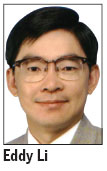Standard deviations on pollution
Updated: 2013-07-26 06:34
By Eddy Li(HK Edition)
|
|||||||||

Last November, the department of environmental protection of Guangdong province released a circular on the national discharge standard for water pollutant in the Pearl River Delta (PRD) area, setting a special limit value regarding electroplating, pulping and papermaking, leather, sugaring, and other industries. The original Appendix II was replaced by Appendix III - a stricter standard that was set to be executed last December.
Due to the high standard which is even more rigorous than Japan and Western countries, however, after half a year, the majority of the companies in the area still cannot reach it. This has put the authorities in a dilemma - the actual situation doesn't allow them to enforce the law.
So how severe exactly is the new standard? Take the total nickel content index as an example. The Appendix III set the limit value as 0.1 (i.e. the nickel content is no more than 0.1 milligrams per liter of discharged water), while the requirement is 4.1 in the US, 5 in France and Spain, 2 in UK and Italy, 0.5 in Germany. In other words, China's standard is 5 to 50 times as high as that in the Western countries.
Take another case of the COD (chemical oxygen demand) index: in Appendix III, the limit value is 50 (i.e. the mass of oxygen consumed per liter of solution is no more than 50 milligrams), and the standard is 160 in Japan, 120 in Germany, and 125 in the European Emission Standards - which indicates that this limit value is one to two times more rigorous than the Japanese or European countries.
In terms of environmental pollution, every company has the obligation to cut water pollutant down to the minimum level and should spare no effort to work with the government. But policy-making and its implementation should also take into consideration the objective conditions and feasibility. After the circular was announced, in which the standard in the electroplating industry was the most severe, Hong Kong-funded electroplating companies in the PRD area felt a strong antagonism for established policy. Two seminars were held on the mainland because of this, in order to collect ideas and complaints in the industry.
In June, a special seminar was also held by the Chinese Manufacturers' Association of Hong Kong concerning this issue, at which related specialists and experts were invited to offer some suggestions and advice. An expert said it is extremely difficult for the companies to stabilize the discharge standard for water pollutant as required under current circumstances. He suggested that he participated in the drafting of Appendix III in the related department, and the positive figures shown at that time on the monitoring statistics of the electroplating industry, which is reported to the department by local governments, had misled the standard to a higher level. It is a universally acknowledged fact that Appendix III is too rigorous for a developing country like China.
My friends from the industry told me that there are mainly two concerns. First, Appendix II was implemented in July, 2010, and Hong Kong companies spent a wealth of money to improve the water-pollutant processing system to meet the requirements. However, after only two and a half years, Appendix III, 30 percent to 400 percent stricter than the previous one, was released. The hardship in business nowadays could no longer support another update in the processing system for many companies. Second, not that many companies even reached Appendix II standards, and those who haven't, are still adjusting. But authorities' enforcing Appendix III now is unfair for Hong Kong companies, which are trying to abide by the law, because accordingly, the local governments are more tolerant to mainland companies, more than half of which have ignored the standard for a long time.
I don't think that relying only on local governments can solve the problem; therefore, as a CPPCC member, I have already proposed a motion to the central government, hoping they can put Appendix III in abeyance for a while and make adjustments based on the status quo, and that local governments can enforce the regulations impartially, instead of covering up for some violators.
The author is vice-president of the Chinese Manufacturers' Association of Hong Kong.
(HK Edition 07/26/2013 page1)